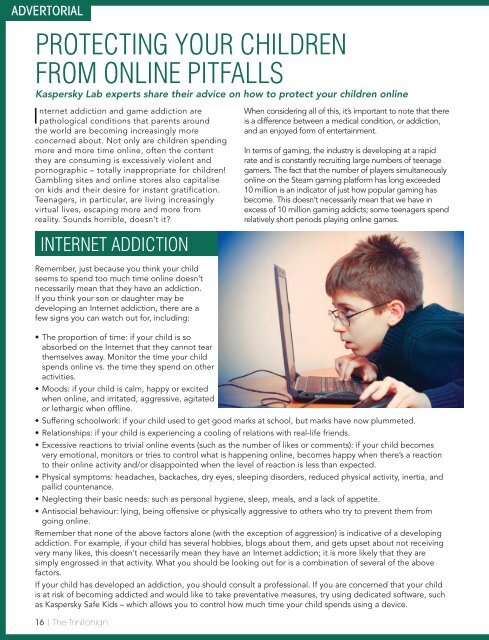TRINITONIAN OCTOBER DIGITAL
Create successful ePaper yourself
Turn your PDF publications into a flip-book with our unique Google optimized e-Paper software.
ADVERTORIAL<br />
PROTECTING YOUR CHILDREN<br />
FROM ONLINE PITFALLS<br />
Kaspersky Lab experts share their advice on how to protect your children online<br />
Internet addiction and game addiction are<br />
pathological conditions that parents around<br />
the world are becoming increasingly more<br />
concerned about. Not only are children spending<br />
more and more time online, often the content<br />
they are consuming is excessively violent and<br />
pornographic – totally inappropriate for children!<br />
Gambling sites and online stores also capitalise<br />
on kids and their desire for instant gratification.<br />
Teenagers, in particular, are living increasingly<br />
virtual lives, escaping more and more from<br />
reality. Sounds horrible, doesn’t it?<br />
INTERNET ADDICTION<br />
Remember, just because you think your child<br />
seems to spend too much time online doesn’t<br />
necessarily mean that they have an addiction.<br />
If you think your son or daughter may be<br />
developing an Internet addiction, there are a<br />
few signs you can watch out for, including:<br />
16 | The Trinitonian<br />
When considering all of this, it’s important to note that there<br />
is a difference between a medical condition, or addiction,<br />
and an enjoyed form of entertainment.<br />
In terms of gaming, the industry is developing at a rapid<br />
rate and is constantly recruiting large numbers of teenage<br />
gamers. The fact that the number of players simultaneously<br />
online on the Steam gaming platform has long exceeded<br />
10 million is an indicator of just how popular gaming has<br />
become. This doesn’t necessarily mean that we have in<br />
excess of 10 million gaming addicts; some teenagers spend<br />
relatively short periods playing online games.<br />
• The proportion of time: if your child is so<br />
absorbed on the Internet that they cannot tear<br />
themselves away. Monitor the time your child<br />
spends online vs. the time they spend on other<br />
activities.<br />
• Moods: if your child is calm, happy or excited<br />
when online, and irritated, aggressive, agitated<br />
or lethargic when offline.<br />
• Suffering schoolwork: if your child used to get good marks at school, but marks have now plummeted.<br />
• Relationships: if your child is experiencing a cooling of relations with real-life friends.<br />
• Excessive reactions to trivial online events (such as the number of likes or comments): if your child becomes<br />
very emotional, monitors or tries to control what is happening online, becomes happy when there’s a reaction<br />
to their online activity and/or disappointed when the level of reaction is less than expected.<br />
• Physical symptoms: headaches, backaches, dry eyes, sleeping disorders, reduced physical activity, inertia, and<br />
pallid countenance.<br />
• Neglecting their basic needs: such as personal hygiene, sleep, meals, and a lack of appetite.<br />
• Antisocial behaviour: lying, being offensive or physically aggressive to others who try to prevent them from<br />
going online.<br />
Remember that none of the above factors alone (with the exception of aggression) is indicative of a developing<br />
addiction. For example, if your child has several hobbies, blogs about them, and gets upset about not receiving<br />
very many likes, this doesn’t necessarily mean they have an Internet addiction; it is more likely that they are<br />
simply engrossed in that activity. What you should be looking out for is a combination of several of the above<br />
factors.<br />
If your child has developed an addiction, you should consult a professional. If you are concerned that your child<br />
is at risk of becoming addicted and would like to take preventative measures, try using dedicated software, such<br />
as Kaspersky Safe Kids – which allows you to control how much time your child spends using a device.


















